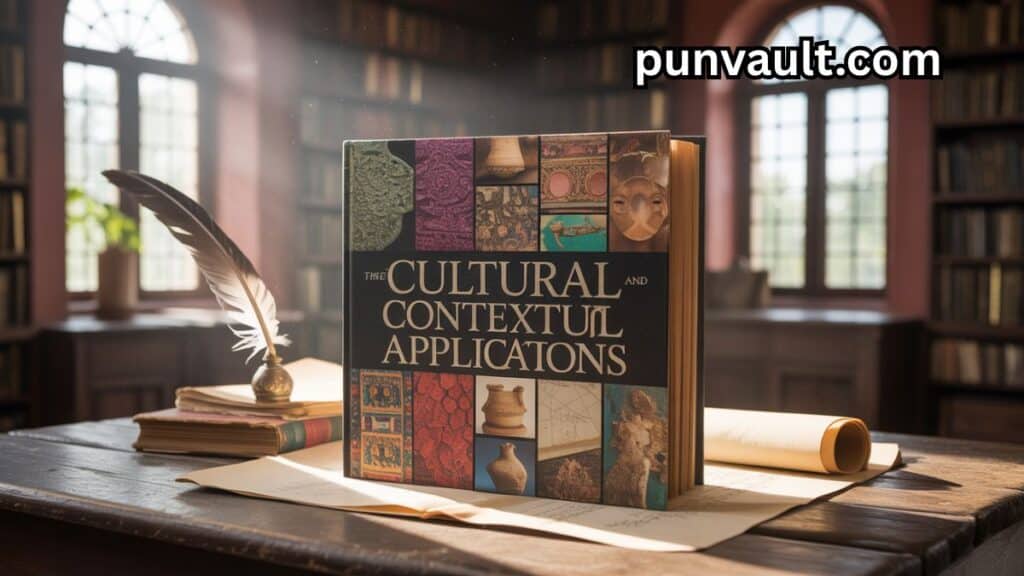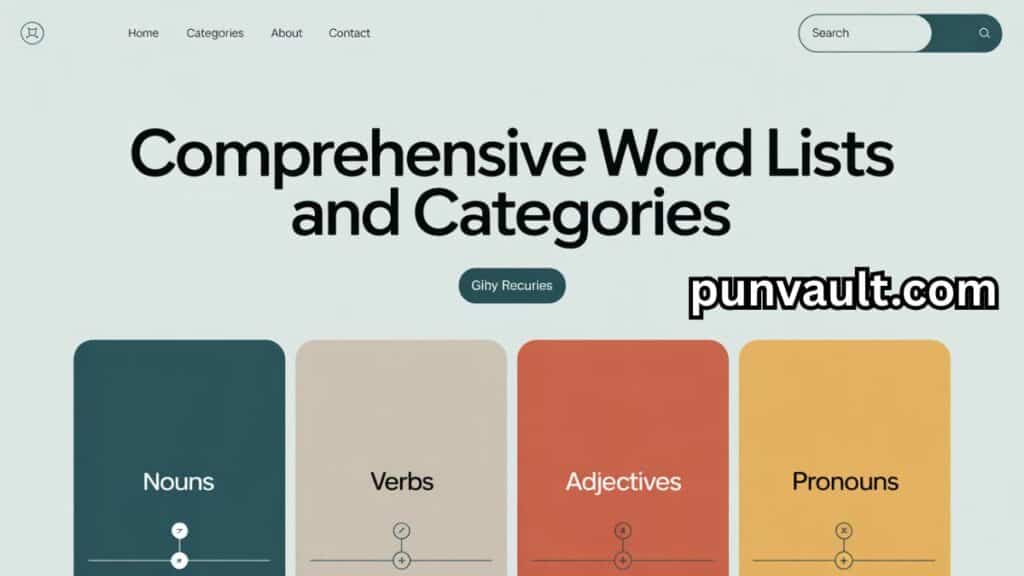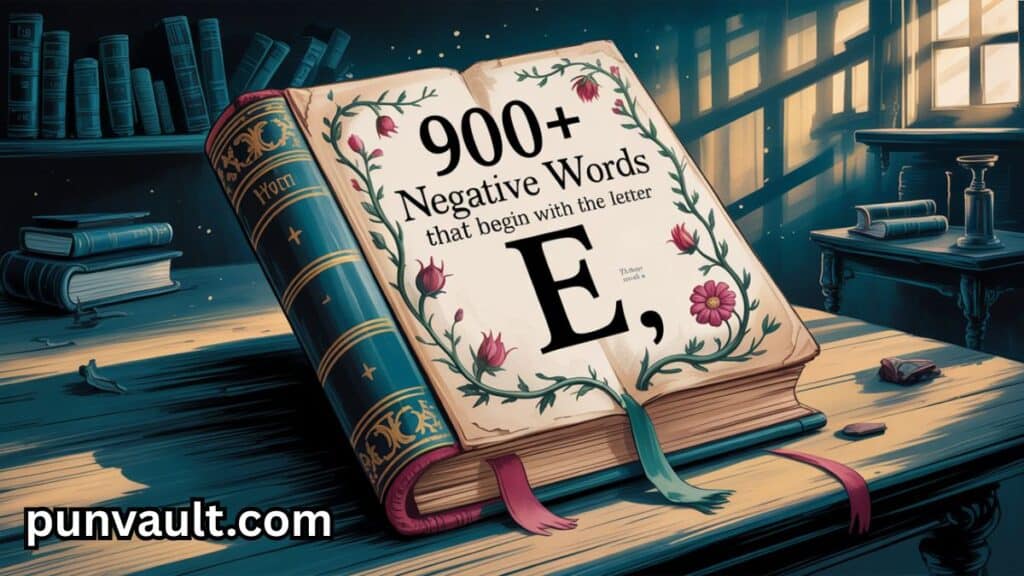900+ Negative Words That Begin With The Letter “E” refers to an extensive collection of English vocabulary where each word starts with the letter “E” and carries a negative, unpleasant, or undesirable meaning. These words range from mild descriptors of annoyance to powerful terms that convey deep criticism, emotional distress, or dangerous situations. They serve as precise linguistic tools to express dissatisfaction, discomfort, or disapproval in various contexts, from casual conversation to professional writing.
Language becomes far more engaging when words evoke strong emotions or vivid imagery, and negative “E” words do exactly that. They can paint eerie landscapes, describe explosive tempers, or capture the essence of egotistical behavior with striking clarity. Whether in literature, debates, or storytelling, such vocabulary adds intensity, depth, and memorability, leaving a lasting impact on the audience.
Negative words that begin with “E” are diverse and versatile, encompassing descriptions of people, emotions, situations, and even abstract concepts. From everyday terms like “embarrassing” and “empty” to rare gems like “eldritch” and “ephemeral,” they offer rich choices for writers, speakers, and communicators. Mastering these words not only enhances expression but also sharpens the ability to convey complex ideas and nuanced feelings with precision.
Core Negative E-Words by Emotional Impact
Psychological Devastation: Words That Wound the Mind
Mental anguish finds its voice through powerful negative adjectives that begin with E. These terms capture states of being that cut deep into human consciousness.
Primary psychological negatives include:
| Word | Definition | Emotional Impact |
|---|---|---|
| Empty | Void of substance or meaning | Existential despair |
| Exhausted | Completely drained of energy | Physical/mental depletion |
| Embittered | Made resentful through harsh experience | Deep-seated anger |
| Estranged | Alienated from relationships | Social isolation |
The word “eerie” stands as perhaps the most versatile psychological negative. It doesn’t simply mean scary – it describes that unsettling feeling when something appears normal but feels fundamentally wrong. Picture walking through an empty playground at midnight, hearing distant laughter with no children in sight.
Exhaustion carries weight beyond physical tiredness. When someone feels emotionally exhausted, they’ve reached a breaking point where even simple tasks feel insurmountable. This sad and depressing word that starts with E captures modern life’s hidden epidemic.
175 Ghost Puns That Are Scarily Funny!
Character Assassination: Personality Flaws in E-Form
Human character flaws find brutal expression in negative words that start with E to describe a person. These terms don’t just criticize – they dissect personality defects with surgical precision.
Core character negatives:
- Egomaniac – Someone whose self-obsession reaches pathological levels
- Egotistical – Excessively conceited and self-centered
- Evil – Profoundly immoral and wicked
- Envious – Consumed by resentment over others’ advantages
- Erratic – Unpredictably inconsistent in behavior
- Evasive – Deliberately avoiding direct answers or commitments
An “egomaniac” transcends simple arrogance. This person genuinely believes the world revolves around their needs, dismissing others’ feelings as irrelevant. They manipulate conversations, relationships, and situations to feed their insatiable hunger for attention and validation.
“Exploitative” individuals view relationships as transactions. They identify vulnerabilities in others and systematically abuse trust for personal gain. Unlike simple selfishness, exploitation involves calculated emotional manipulation.
Physical Revulsion: Appearance and Health Negatives
Our language contains numerous negative E-words that describe physical unattractiveness or poor health conditions. These terms often carry emotional weight beyond their literal meanings.
Physical negative categories:
Size and proportion issues:
- Enormous – Frighteningly large in scale
- Emaciated – Dangerously thin from starvation
- Elephantine – Awkwardly massive and ungainly
Health and vitality problems:
- Enfeebled – Weakened by age or illness
- Exhausted – Depleted of physical energy
- Eczematous – Affected by chronic skin inflammation
Appearance degradation:
- Eroded – Worn away by time and elements
- Expired – Past the point of freshness or life
- Eviscerated – Having internal organs removed or destroyed
The term “emaciated” paints a picture more disturbing than simply “thin.” It suggests visible bones, sunken cheeks, and the hollow-eyed look of severe malnutrition. This word carries implications of suffering that lighter synonyms cannot match.
Behavioral Destruction: Actions That Harm

Seashell Puns and Jokes
Aggressive and Violent Behaviors
Human destructiveness manifests through various negative words that start with E, describing harmful actions. These terms capture the spectrum from minor irritation to devastating violence.
Aggressive action words:
- Exploding – Erupting with sudden, destructive force
- Eviscerating – Tearing apart with brutal thoroughness
- Exterminating – Destroying completely and systematically
- Erasing – Removing all traces of existence
- Enslaving – Forcing into complete subjugation
- Entrapping – Capturing through deception or force
When someone “explodes” emotionally, they don’t just get angry – they unleash accumulated rage with devastating effect. Relationships, careers, and reputations can be destroyed in the blink of an eye.
“Eviscerating” criticism goes beyond harsh feedback. It systematically destroys confidence, dreams, and self-worth. Politicians, critics, and toxic individuals often eviscerate their targets with calculated precision.
Manipulative and Deceptive Practices
Deception takes many forms, each captured by specific negative E-words that reveal the complexity of human dishonesty.
Deceptive behavior patterns:
| Behavior Type | E-Word Examples | Typical Contexts |
|---|---|---|
| Financial fraud | Embezzling, Extortionate | Business, politics |
| Emotional manipulation | Exploitative, Evasive | Relationships, therapy |
| Information control | Equivocating, Evading | Legal, media |
| Social exclusion | Excluding, Exiling | Groups, communities |
“Embezzling” represents more than theft – it’s betrayal of institutional trust. When someone embezzles funds, they violate the confidence placed in their position, often affecting multiple victims who trusted the system.
“Equivocating” speakers use deliberately ambiguous language to mislead without technically lying. They craft responses that sound informative while revealing nothing substantial, leaving listeners confused and frustrated.
600+ Goth Usernames That Scream Dark Aesthetic
Specialized Negative E-Word Categories
Professional and Academic Failures
Career disappointments and academic shortcomings have their vocabulary of negative words that begin with the letter E. These terms describe various forms of professional inadequacy.
Career-related negatives:
- Expelled – Forcibly removed from an institution or position
- Eliminated – Removed from consideration or competition
- Excluded – Deliberately left out of opportunities
- Exiled – Banished from the professional community
- Extinguished – Having one’s career or reputation destroyed
Academic and intellectual failures:
- Erroneous – Containing fundamental mistakes
- Elementary – Lacking sophistication or depth (in context)
- Extraneous – Irrelevant to the main topic
- Expedient – Chosen for convenience rather than principle
An “expelled” student doesn’t just leave school – they’re forced out due to serious violations. This designation can follow them throughout life, affecting college applications, job prospects, and social standing.
“Erroneous” work contains more than simple mistakes. It reflects flawed reasoning, inadequate research, or a fundamental misunderstanding of core concepts. Academic careers can be extinguished by consistently erroneous scholarship.
Relationship and Social Disasters
Human connections generate their collection of sad and depressing words that start with E. These terms capture the pain of broken relationships and social isolation.
Romantic relationship failures:
- Estranged – Emotionally distanced from former partner
- Exiled – Banished from shared social circles
- Excluded – Left out of the former couple’s activities
- Exhausted – Emotionally drained by relationship conflicts
Family dysfunction patterns:
- Estranged – Cut off from family relationships
- Embittered – Made resentful by family conflicts
- Encumbered – Burdened by family obligations
- Entrapped – Stuck in toxic family dynamics
Social exclusion experiences:
- Ejected – Forcibly removed from social groups
- Eliminated – Systematically excluded from activities
- Exiled – Banished from community participation
- Eclipsed – Overshadowed by others’ social success
The term “estranged” describes more than simple separation. It implies a formerly close relationship that has deteriorated beyond repair, often involving unresolved hurt and ongoing resentment.
Tulip Puns and Jokes
Rare and Archaic Negative E-Terms

The English language preserves numerous obscure words that begin with the letter E – terms that carry negative connotations while sounding almost academic in their obscurity.
Historical negative terms:
| Word | Definition | Modern Usage |
|---|---|---|
| Execrable | Extremely bad or unpleasant | Literary criticism |
| Egregious | Outstandingly bad | Legal, academic |
| Efface | Erase or obliterate | Literary writing |
| Eschew | Deliberately avoid | Formal writing |
| Excoriate | Criticize harshly | Political commentary |
Obscure psychological terms:
- Ennui – Deep boredom and dissatisfaction
- Enervate – Drain of energy or vitality
- Encumber – Burden with difficulties
- Erudite – Showing great learning (can be negative in context)
Scientific and medical negatives:
- Etiolated – Weakened from lack of light
- Exsanguinate – Drain of blood
- Eutrophication – Excessive nutrient enrichment causing ecosystem collapse
- Erosion – Gradual destruction of material
The word “ennui” captures a specifically modern form of despair – the crushing boredom that comes from having everything yet feeling completely unfulfilled. Unlike simple boredom, ennui suggests existential emptiness that material success cannot cure.
“Excoriate” means more than criticize harshly. It implies stripping away pretense and dignity, leaving the target exposed and wounded. Political commentators often excoriate opponents with systematic thoroughness.
300+ Cheating Captions That Reveal Heartbreak & Betrayal
Grammar-Specific Negative E-Words
Devastating Adjectives
Negative E-adjectives provide the descriptive power to paint detailed pictures of unpleasant realities. These words modify nouns with precision and emotional impact.
Intensity-based organization:
Mild negatives (annoying but manageable):
- Eccentric – Unconventionally strange
- Edgy – Slightly irritating or tense
- Elusive – Difficult to catch or achieve
- Enigmatic – Mysteriously unclear
Moderate negatives (seriously problematic):
- Embarrassing – Causing shame or awkwardness
- Exhausting – Extremely tiring
- Expensive – Costing more than reasonable
- Exasperating – Intensely annoying
Extreme negatives (devastating impact):
- Evil – Profoundly wicked
- Excruciating – Causing intense pain
- Exterminating – Destroying
- Eviscerating – Brutally tearing apart
Each intensity level serves different communication needs. “Eccentric” might describe a harmless quirk, while “evil” indicates fundamental moral corruption.
Action Words That Destroy
Negative E-verbs capture various forms of harmful action, from subtle manipulation to outright destruction.
Categories of destructive action:
Physical destruction verbs:
- Explode – Burst with destructive force
- Erode – Gradually wear away
- Eviscerate – Remove internal organs or essence
- Extinguish – Put out completely
- Eliminate – Remove entirely
Emotional/psychological harm verbs:
- Embarrass – Cause shame or awkwardness
- Exhaust – Completely drain energy
- Embitter – Make resentful
- Exclude – Leave out deliberately
- Exile – Banish from the community
Social and professional damage verbs:
- Expel – Force out of the institution
- Excommunicate – Exclude from religious community
- Expose – Reveal damaging information
- Exploit – Take unfair advantage
- Extort – Obtain through threats
The verb “eviscerate” originally described removing an animal’s internal organs. In modern usage, it means destroying the essential qualities or heart of something. Critics eviscerate bad films, politicians eviscerate opponents’ arguments.
195+ Best Frat Boy Instagram Captions to Rule Your Feed
Modifying Adverbs of Negativity
Adverbs that begin with the letter E can intensify negative descriptions, adding layers of meaning to already unpleasant situations.
Common negative E-adverbs:
- Exasperatedly – In an intensely frustrated manner
- Erratically – In an unpredictably inconsistent way
- Embarrassedly – With visible shame or awkwardness
- Evasively – While avoiding direct response
- Egotistically – With excessive self-focus
- Excessively – To an unreasonable degree
- Excruciatingly – In an intensely painful way
- Emotionlessly – Without any feeling or expression
These adverbs don’t just modify actions – they reveal the emotional state or manner behind the action. Someone who speaks “evasively” isn’t just avoiding questions; they’re doing so in a way that suggests guilt or discomfort.
Cultural and Contextual Applications

Halloween and Horror Vocabulary
Halloween words that start with E tap into our deepest fears and fascination with the supernatural. These terms create atmosphere and evoke specific emotional responses.
Classic horror E-words:
- Eerie – Mysteriously unsettling
- Ectoplasmic – Relating to ghostly substance
- Eldritch – Weird and supernatural
- Ethereal – Ghostly and otherworldly
- Entombed – Buried alive or sealed in a grave
- Enslaved – Controlled by supernatural forces
Modern horror adaptations:
- Extinction – Complete species elimination
- Epidemic – Rapidly spreading disease
- Evacuation – Mass flight from danger
- Execution – Systematic killing
- Experimentation – Unethical scientific testing
The word “eldritch” comes from Old English, meaning weird or supernatural. H.P. Lovecraft popularized it in cosmic horror stories, where eldritch entities represent incomprehensible threats to human sanity.
“Ectoplasmic” phenomena allegedly represent physical manifestations of spiritual energy. Whether you believe in ghosts or not, the word effectively communicates something unnatural and disturbing.
80 Simple Birthday Wishes That You Can Send to Anyone
Modern Digital Age Negatives
Technology has spawned new categories of negative words that start with E, reflecting contemporary anxieties and digital-age problems.
Internet and social media negatives:
- Exposed – Having private information revealed online
- Excluded – Left out of digital communities
- Exploited – Having personal data misused
- Exhausted – Burned out from constant connectivity
- Echo – Living in an information bubble (echo chamber)
Technology failure terms:
- Error – System malfunction or mistake
- Expired – No longer valid or functional
- Eliminated – Removed from digital platforms
- Encrypted – Made inaccessible (can be negative in context)
- Extraction – Unauthorized data removal
Gaming and competition negatives:
- Eliminated – Knocked out of competition
- Exploiting – Using game mechanics unfairly
- Expired – Run out of time or lives
- Exhausted – Depleted resources or energy
The concept of being “exposed” online carries a unique modern terror. Unlike traditional embarrassment, digital exposure can be permanent, searchable, and globally accessible.
Practical Applications and Usage Guide
Writing Enhancement Strategies
Negative E-words can transform ordinary writing into compelling, emotionally resonant communication. The key lies in precise selection and strategic placement.
Intensity progression techniques:
Instead of repeatedly using “bad,” create escalating tension:
- Start mild: “eccentric” behavior
- Build tension: “erratic” actions
- Reach climax: “explosive” confrontation
- Conclude devastation: “eviscerated” relationships
Context-appropriate selection:
| Writing Type | Recommended E-Words | Effect Achieved |
|---|---|---|
| Horror fiction | Eerie, eldritch, entombed | Atmospheric dread |
| Character study | Egotistical, embittered, estranged | Psychological depth |
| Social criticism | Exploitative, exclusionary, elitist | Pointed commentary |
| Action scenes | Explosive, eviscerating, eliminating | Dynamic tension |
Avoiding cliché combinations:
Common pairings lose impact through overuse. Instead of “evil villain,” try “egregious antagonist” or “execrable character.” Replace “empty promise” with “ephemeral commitment” or “evanescent assurance.”
Bingo Jokes and Puns
Vocabulary Building Techniques
Mastering negative E-words requires systematic practice and contextual understanding. These strategies accelerate retention and improve usage accuracy.
Memory enhancement methods:
Etymology exploration:
- Egregious comes from Latin “egregius” (standing out from the flock)
- Eliminate derives from “limen” (threshold) – literally “remove from threshold”
- Eviscerate combines “ex” (out) + “viscera” (internal organs)
Semantic clustering: Group related terms by meaning:
- Anger cluster: Enraged, exasperated, embittered, explosive
- Fear cluster: Eerie, ominous, terrifying, petrifying
- Destruction cluster: Erase, eliminate, extinguish, eviscerate
Progressive difficulty levels:
Beginner level (common usage): Empty, evil, expensive, exhausted, embarrassing
Intermediate level (formal writing): Egregious, eliminate, exasperate, exclude, exploit
Advanced level (literary usage): Execrable, excoriate, enervate, eschew, efface
Practice exercise suggestions:
- Daily substitution: Replace common negative words with E-alternatives
- Intensity scaling: Practice moving from mild to extreme E-negatives
- Context switching: Use the same E-word in different scenarios
- Synonym mapping: Connect E-words with non-E equivalents
Comprehensive Word Lists and Categories

Alphabetical Master List: A-D
This section presents carefully organized negative words that start with E, arranged for easy reference and maximum utility.
Early Alphabet (Ea-Ed):
- Eager (negative context: overly desperate)
- Earmarked (designated for an unpleasant purpose)
- Eavesdropping (unauthorized listening)
- Ebbing (declining, weakening)
- Eccentric (unpleasantly strange)
- Eclipsed (overshadowed, diminished)
- Edacious (greedy, consuming)
- Edgy (irritatingly tense)
Mid-range terms (Ef-El):
- Efface (erase)
- Effete (weakened by decadence)
- Effrontery (shameless audacity)
- Egocentric (self-centered)
- Egomaniac (pathologically self-obsessed)
- Egotistical (excessively conceited)
- Egregious (outstandingly bad)
- Ejected (forcibly removed)
- Eldritch (weird, supernatural)
- Eliminated (completely removed)
70 Simple Thank You Messages for a Surprise Birthday Party
Thematic Organization: Emotional Categories
Depression and Sadness Cluster:
These sad and depressing words that start with E capture various forms of melancholy and despair:
- Empty – Void of meaning or substance
- Enervated – Drained of vitality
- Ennui – Deep boredom and dissatisfaction
- Ephemeral – Fleeting, temporary (sadly so)
- Estranged – Emotionally separated
- Ethereal – Ghostly, insubstantial
- Evaporated – Disappeared without a trace
- Exhausted – Completely depleted
- Exiled – Banished from belonging
- Expired – Past the point of vitality
Fear and Anxiety Cluster:
Terms that evoke terror and unease:
- Eerie – Mysteriously frightening
- Ominous – Threatening future harm
- Epidemic – Rapidly spreading danger
- Extinction – Complete elimination
- Execution – Systematic killing
- Exposed – Vulnerable to attack
- Explosive – Unpredictably dangerous
- Extremist – Dangerously radical
- Entrapment – Caught without escape
- Encroachment – Gradual invasion
Usage Intensity Chart
Understanding the relative strength of negative E-words helps writers choose appropriate terms for their intended impact.
| Mild Impact | Moderate Impact | Severe Impact | Devastating Impact |
|---|---|---|---|
| Eccentric | Embarrassing | Egregious | Evil |
| Edgy | Exhausting | Explosive | Execrable |
| Elusive | Expensive | Excruciating | Eviscerating |
| Enigmatic | Exasperating | Extreme | Exterminating |
This progression helps writers calibrate emotional impact. A character might start as “eccentric,” become “embarrassing,” then “egregious,” and finally “evil” as their negative traits intensify.
Advanced Applications and Nuanced Usage
Literary and Academic Applications
Negative E-words serve specific functions in different types of formal writing. Academic papers, literary analysis, and professional criticism require precise terminology.
Literary criticism applications:
- Execrable – For completely worthless artistic work
- Egregious – For obvious, inexcusable flaws
- Enervating – For work that drains rather than energizes
- Ephemeral – For forgettable, insubstantial content
- Ersatz – For cheap imitations of quality work
Academic writing precision:
Instead of “wrong,” academic writers choose:
- Erroneous (factually incorrect)
- Egregious (obviously flawed)
- Expedient (convenient but unprincipled)
- Extraneous (irrelevant to the main argument)
Professional Communication
Business and professional contexts require diplomatic ways to express negative assessments. Negative E-words can provide necessary criticism while maintaining a professional tone.
Performance evaluation language:
- “The project timeline was excessively optimistic” (instead of “impossible deadline”)
- “Resource allocation proved erratic” (instead of “completely disorganized”)
- “Communication patterns were evasive” (instead of “dishonest”)
- “Results were ephemeral” (instead of “temporary failure”)
Diplomatic conflict resolution:
- “Your approach seems exclusionary” (instead of “you’re being discriminatory”)
- “This decision appears expedient” (instead of “you’re taking shortcuts”)
- “The situation has become exasperating” (instead of “this is driving me aggravated“)
Cultural Impact and Evolution

How Negative E-Words Shape Perception
Language doesn’t just describe reality – it shapes how we think about and experience it. Negative E-words carry cultural weight that influences social attitudes and behaviors.
Historical evolution examples:
The word “eccentric” once simply meant “off-center” in geometry. Over time, it evolved to describe people whose behavior deviates from social norms. Today, “eccentric” can be either mildly positive (creative nonconformist) or negative (antisocially weird), depending on context.
“Eliminate” entered English through Latin, originally meaning to cross the threshold (exit). Modern usage encompasses everything from contest elimination to species extinction. The word’s evolution reflects humanity’s growing power to completely remove things from existence.
How Many Chapters Are in the Bible From Genesis to Revelation?
Regional and Dialectal Variations
Negative E-words carry different connotations across English-speaking regions. These variations affect how the same words are perceived and used.
British vs. American usage:
- “Eccentric” is more tolerated (even celebrated) in British culture
- “Elaborate” (as criticism) is stronger in American academic writing
- “Excessive” carries more moral judgment in American contexts
- “Elitist” has become more politically charged in recent American usage
Professional field variations:
Medical professionals use “etiolated“ (weakened by lack of light) as a precise description, while literary writers use it metaphorically for emotional/spiritual weakness.
Legal writing employs “egregious” to indicate clear violations of professional standards, while casual usage has diluted its specific meaning.
Conclusion:
Negative Words That Begin With The Letter “E” give us a strong way to describe unpleasant things with clarity. They help express feelings, situations, and actions that are troubling, frustrating, or harmful. From common words like “empty” and “excessive” to rare ones like “eldritch,” each term adds a unique shade of meaning. Using them well can make communication sharper and more impactful.
Learning Negative Words That Begin With The Letter “E” also builds a richer vocabulary. It allows writers and speakers to be more precise and creative. These words can set a mood, create tension, or highlight problems in a story or discussion. They are powerful tools for expressing emotions and describing events in detail. A strong grasp of them makes language more vivid and engaging.
FAQs:
What are Negative Words That Begin With The Letter “E”?
They are words starting with “E” that describe unpleasant, harmful, or undesirable things.
How many Negative Words That Begin With The Letter “E” are in this list?
The list contains over 900 negative “E” words, including common and rare terms.
Can these words be used in professional writing?
Yes, they can add clarity and precision, but they should be used in the right tone and context.
Are there rare Negative Words That Begin With The Letter “E”?
Yes, examples include “eldritch,” “eviscerate,” and “ephemeral” in a sad context.
Why learn Negative Words That Begin With The Letter “E”?
They help make language richer, more expressive, and more accurate.

Abdul Matloob is a wordsmith with a sharp eye for grammar and a playful love for puns. Blending linguistic precision with clever humor, he crafts content that delights language lovers and grammar geeks alike. Whether he’s breaking down the quirks of English grammar or delivering punchy puns that make readers groan and grin, Abdul Matloob turns language into both an art and a game.

